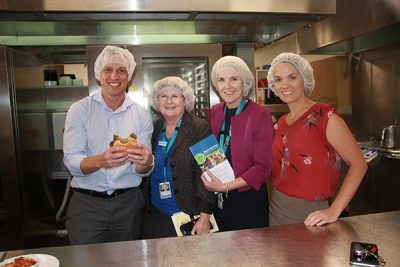
Minister for Health Steven Miles taste tests one of the new room service menu options at The Prince Charles Hospital.
TPCH launches restaurant-quality room service
Patients at The Prince Charles Hospital (TPCH) can now order all-day hot breakfasts, burgers, stir fries or even pancakes on demand, under Queensland’s Health’s first public hospital Room Service Initiative.
Minister for Health and Minister for Ambulance Services Steven Miles said under the new food service model, patients can order meals anytime between 6.30am and 7pm through their bedside phones, or own mobile devices.
“Nutrition is a really important issue for all hospitals as many patients lose their appetite, but have increased nutritional demands during their hospital stay,” Mr Miles said.
“Under this new and innovative model, patients will have unprecedented flexibility to choose not just what they want to eat, but when.”
With a mammoth 768,000 meals to prepare fresh in-house each year, TPCH has unveiled its newly-renovated commercial kitchen, boasting everything from induction cooktops and turbo chef ovens to state-of-the-art griddle plates, cappuccino machines and a cold larder station to prepare sandwich combinations at each patient’s request.
TPCH Dietitian Team Leader Food Services Bianca Neaves said the kitchen has even incorporated induction charging bases that will keep meals hot until they reach the patient’s bedside.
“Food is an integral part of each patient’s clinical care so we are really excited to be rolling out a model that improves nutritional outcomes, which in turn helps patients recover better and get home sooner,” Ms Neaves said.
“While we currently turn over almost 40,000 loaves of bread and 110,000 litres of milk each year, we will be expanding the variety on offer, as well as incorporating a much greater food selection for our patients with specific dietary requirements, allergies or restrictions.”
TPCH Executive Director Michele Gardner said the hospital has increased its kitchen staff to 120, including cooks to prepare meals fresh and in house, and staff to take phone orders.
“Delivering individualised food choices means that in addition to improving our patients’ overall experiences, we’re significantly reducing plate waste, which is more efficient economically and environmentally,” Ms Gardner said.
“It also means all our patients, or family members on their behalf, will be able to plan their meal times better around clinical treatment or tests.”
